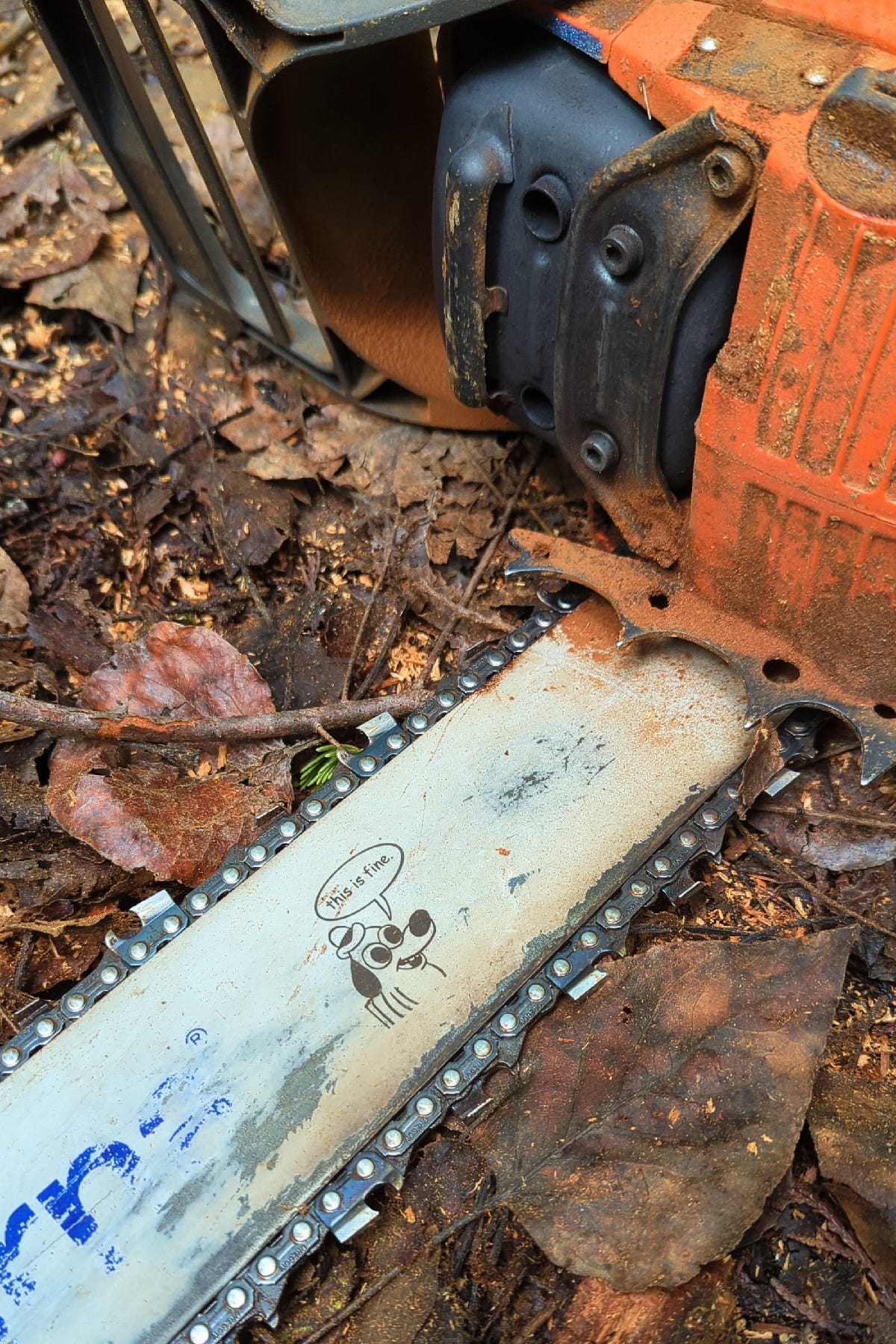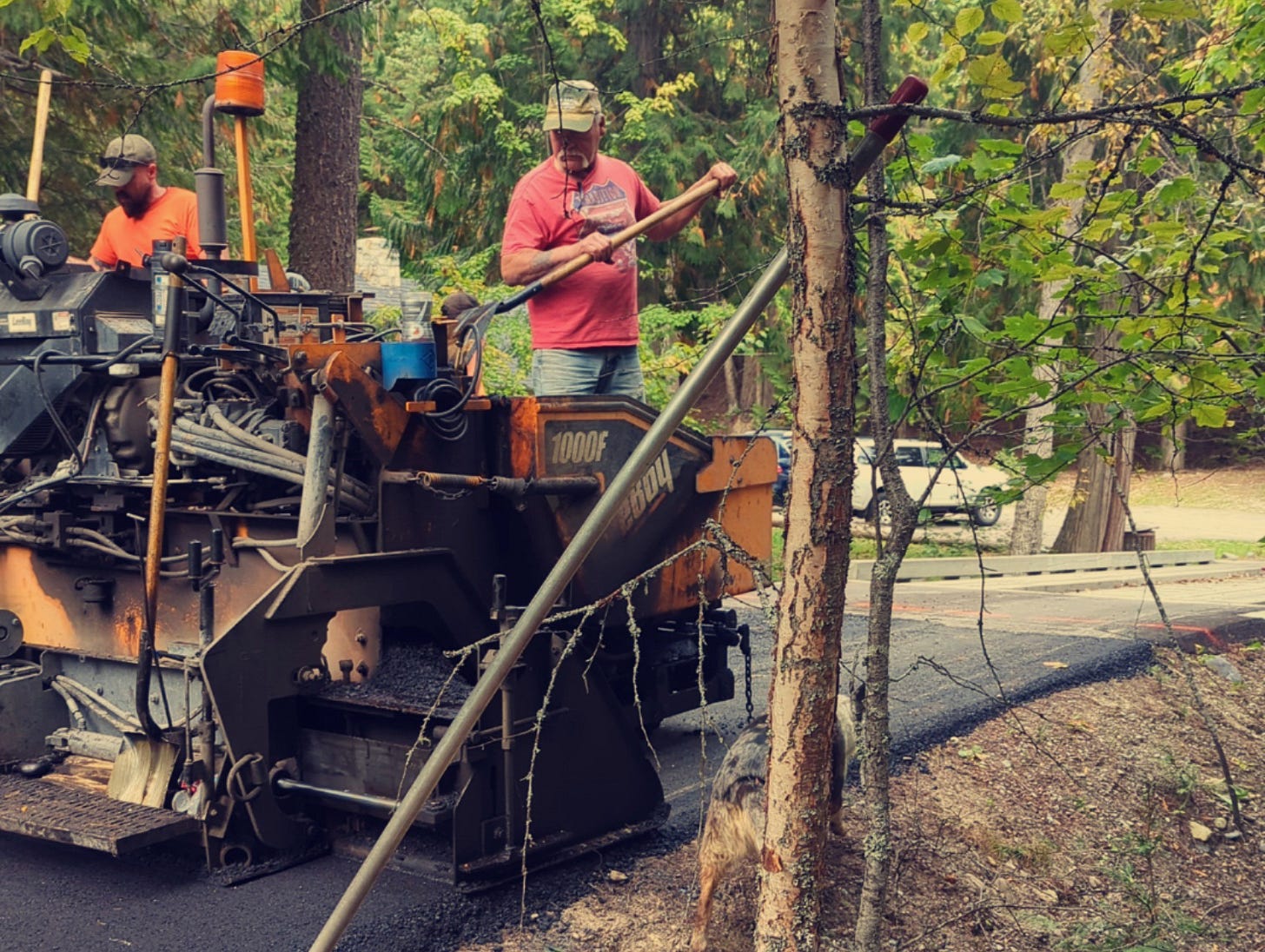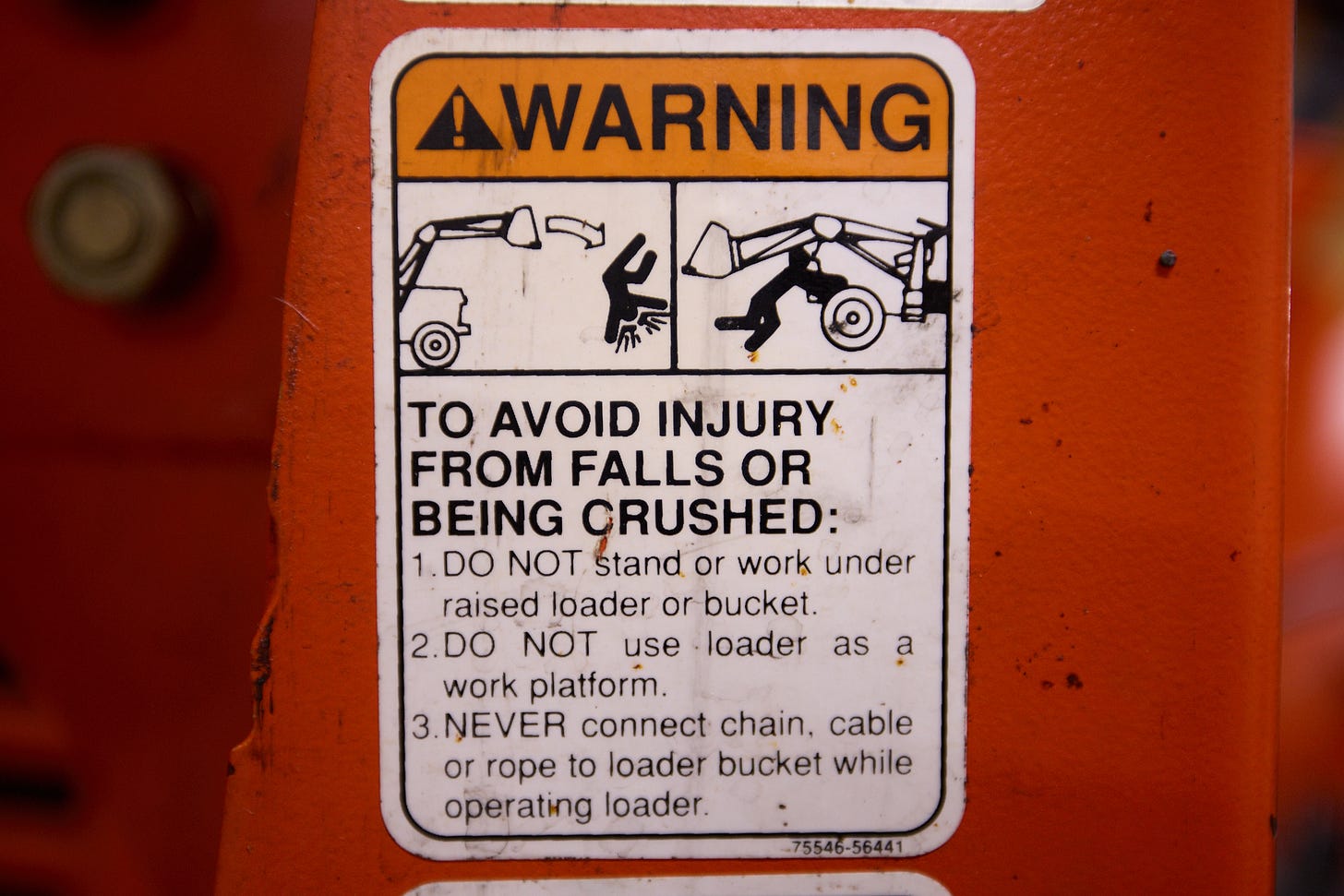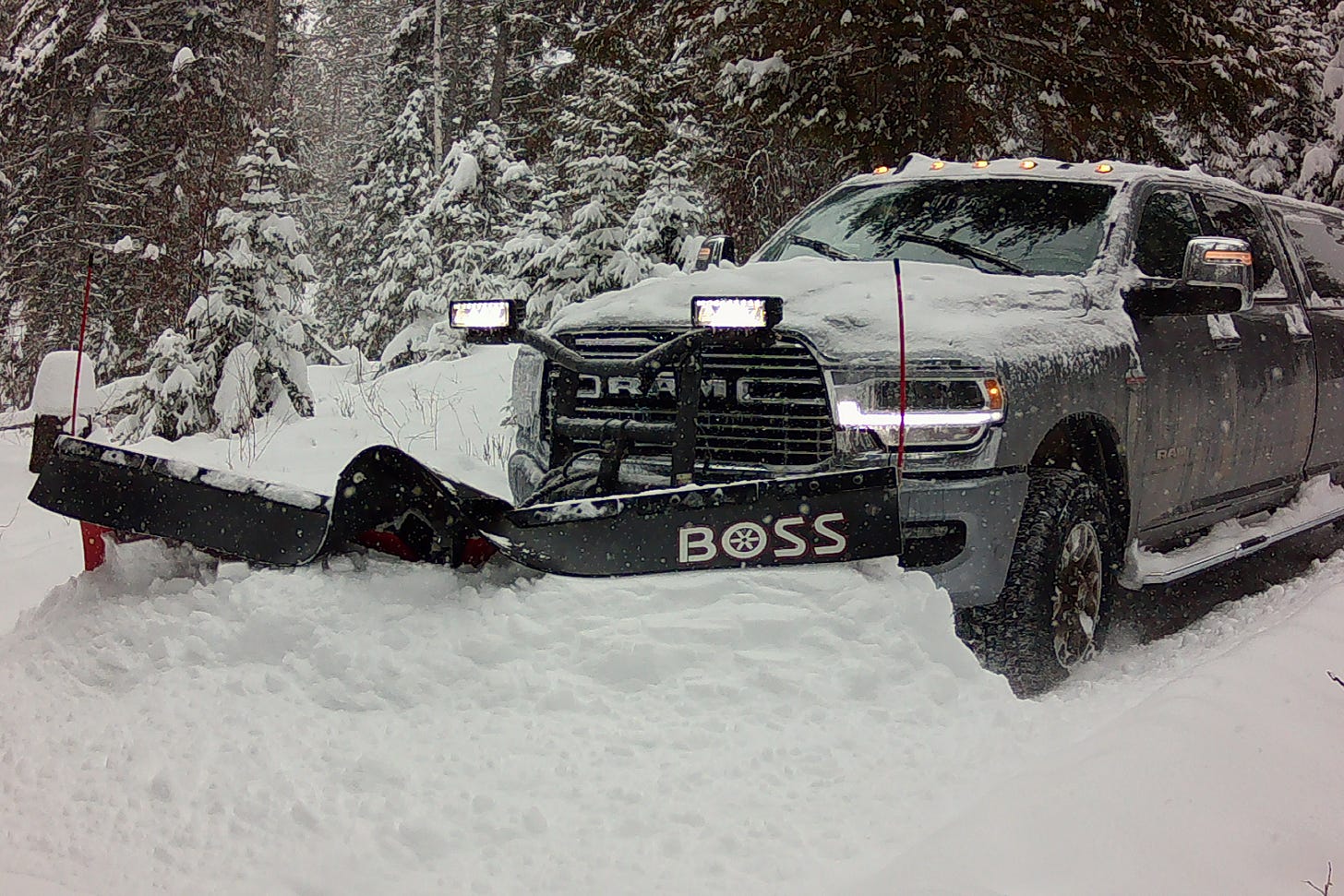Dispatches from the farm upstate
Middle-aged computer expert opts to escape civilization, offers dubious life advice.
Every now and then, I solicit topics for articles from readers on social media. After a while, I learned that open-ended prompts don’t work; it’s better to come up with a couple of suggestions and create a quick poll.
In the most recent poll, I listed “rural living tips” next to a handful of serious choices. I’m a one-time computer whiz who immigrated to the US, lived in the Silicon Valley for a while, and then ditched it all for a rural parcel in the Pacific Northwest. Still, I figured no one wanted to hear about that; an earlier article that touched on the subject is one of my least-read posts.
Well, I played myself: the joke option won by a wide margin. Today, I intend to hold up my end of the bargain. My apologies to all the readers who aren’t interested in tractor maintenance.
Prologue: how did we end up here?
My first tech job paid less than $1,000 a month; fifteen short years later, I was living in the Silicon Valley and making that much in a day. But at all rungs of that ladder, I met people who lived paycheck-to-paycheck, their expenses growing in lockstep with payroll slips.
Over time, this started to rub me the wrong way. As techies, we had a shot at financial independence — and we were squandering it away. Sure, the math didn’t work out if you planned to stay in the San Francisco Bay Area for life. But you could grind there for a while and then move to a more affordable place. Keep working if you want to, but on your own terms.
For me, the only question about this plan was where to go. In my youth, I couldn’t imagine not living in a big city: I liked the culture, the food, the vibrant night life. Yet, when you settle down, all this starts mattering less. You don’t need nightclubs; you dream of a nice workshop and some open space for children and pets to roam.
About a decade ago, we started looking for just that: a rural parcel with a view. After two cross-country road trips, we settled on a bit of forest acreage in the Pacific Northwest. It cost us as much as a bike shed in the Silicon Valley. Over the next couple of years, we kept fixing up the property while visiting for Christmas and summer vacations. When COVID-19 hit, we snuck out for longer to escape lockdowns and school closures. Soon after that, we sold our California home and moved into the woods.
The man in the high castle
It’s easy to tell urban and suburban settings apart: suburbs are just a part of the city that’s dominated by single-family homes and manicured lawns. Rural living, in contrast, isn’t about construction style; it’s about access to services. In a rural place, you’re not getting municipal water or sewer, you have no local police department, and fire or EMT services might be a long way away.
Rural jurisdiction is funny too: you no longer have to deal with city planning departments or HOAs, but it’s not the bargain you might be hoping for. You probably need a permission straight from the state capital to build a septic system or dig a well — and if you’re unlucky, you might get a visit from the feds, too. The much-politicized Sackett v. EPA decision involved a family who bought an unassuming rural plot to build a single-family home, and ended up getting pulled into a decade-long fight with the federal government. The fight was about regulatory power, not the (near-zero) impact of what the Sacketts wanted to do. When the family finally prevailed, half the country gave them cross looks.
The need to interact with such distant and incomprehensible bureaucracies is probably to blame for the siege mentality among some rural populations. When a regulator in Sacramento decides it’s time to ban gas-powered chainsaws or leaf blowers, it’s good for the suburbs, where such equipment is a nuisance, and where batteries are usually enough. At the same time, it’s preposterous to those who own a forest and need to keep tree diseases and fire risks in check. We bought a top-of-the-line battery-powered Husqvarna saw; it’s great for small projects, but woefully inadequate for more serious forestry work.
A kingdom, for a price
Our place is rural but not particularly remote: we are tied to the electric grid, there is a county-maintained gravel road nearby, and we’re about ten minutes away from a small town.
In most other respects, we are on our own. As hinted earlier, we’re on well water, we have a septic system, and we maintain about half a mile of a private road — complete with a small bridge — to get in and out. Repairs to this infrastructure are our problem, and can easily run five figures or more.
The expenses don’t end there. We get roughly 40 snow days per season, typically totaling about 85 inches overall. We used to pay a contractor to plow the driveway, but this ended up being thousands of dollars a year. It was ultimately cheaper to buy my own truck-sized plow — and a tracked snowblower to mop it all up.
Of course, if you live in a city, you still foot the bill for all this: it’s rolled into the taxes you pay. But if you have a rural address, you end up paying twice. You still owe the same amount to the county, the state, and the feds; there’s no tax break for the privilege of owning a road.
The added costs are still nowhere near the price tag of living SF Bay Area, but they are nothing to sneeze at — and are a far cry from the fantasy peddled by all the “homesteading” influencers on YouTube and Instagram.
It’s a cruel, cruel summer
Summer months are about the long term. In a forest with about 20,000 trees, almost nothing gets wrapped up in a single season. There’s soil erosion to repair and drainage to improve. There are beetle-killed conifers to cut down, process into firewood, and haul away. There are excessively dense stands to gradually thin and toss into the chipper. And there are invasive weeds that outcompete native vegetation, to be selectively suppressed until they no longer bounce back.
Although summers can feel more leisurely than winters, they are far more perilous to limb and life; you’re spending time around tractors, wood chippers, brush mowers, and so on. Forestry and farm work are some of the most dangerous professions in the US, and the bulk of the injuries happen when the weather is nice.
None of the summer projects are urgent, but the work piles up if neglected. Having to take care of land also challenges many naive beliefs about conservation. In the Pacific Northwest, the choice isn’t between living in a pristine forest or a clearcut hellscape. It’s between actively maintaining an ecosystem, or ending up with a tinderbox — plus an acre of Canada thistle on the side. Herbicides and chainsaws are less damaging than most “natural” alternatives.
When the long night falls
If summers are about strategy, winters are about taking things day by day. There is much less that needs to be done, but every substantial snowfall is an emergency that must be dealt with right away. A foot of fresh snow is not a problem. Let it pile up higher and you might end up getting stuck for days or weeks.
DIY snowplowing is quite enjoyable when you are sitting in the cab; it’s less fun if you need to dig the vehicle out. It’s also a good crash course in offroad recovery: you will get stuck, probably more than once. It’s essential to carry chains, straps, warm gloves — and know someone with a tractor or a sufficiently beefy 4WD car.
Even with these precautions, the truck is a single point of failure. As mentioned, we have a walk-behind snowblower and a compact tractor with a front loader, but they are no match for our driveway. I have a cache of spare parts, but also aim to have enough food and other necessities to get through major equipment malfunctions and freak winter storms.
On that last note, power outages are inescapable in rural regions — and in the winter, they might mean losing water and heat. We have a beefy diesel generator to keep the lights on, plus redundant non-electric heating options for the home. The firewood we process in the summer is a part of the contingency plan.
On the flip side, the season is far more serene and beautiful than the slush-filled misery of winter urban life.
I write well-researched, original articles about geek culture, electronic circuit design, and more. If you like the content, please subscribe. It’s increasingly difficult to stay in touch with readers via social media; my typical post on X is shown to less than 5% of my followers and gets a ~0.2% clickthrough rate.






Some random footnotes, in part in response to HN quips:
1) Travel: although the distances are notionally larger, we almost certainly spend less time in traffic than we did in the SF Bay Area. This notably includes taking kids to school. So in a way, many services and attractions feel closer, even though they are farther away.
2) Connectivity: this is a major issue for rural land; FCC broadband maps are brazen lies used to justify pocketing billions in federal grants. The only good choice is Starlink - which, weirdly, doesn't qualify as "broadband" per the FCC.
3) Kids' social life: someone on HN asked why we're denying the perks of urban life to kids if I valued that highly in my earlier years. First, you don't get the urban experience in the SF Bay Area: SV kids are chaperoned from one planned activity to another and get little unsupervised social time. Second, our kids are their own people, and I don't think they are bummed out about the move - especially since we aren't exactly cut off from the rest of the world. They go to schools and major metro areas (Seattle, Portland, etc) are just a short flight away.
4) Expenses, necessity vs convenience: a person on HN pointed out that some of the things I describe are "luxuries"; for example, you don't need to be able to flush the toilet during a day-long power outage; there's also no need to plow the entire driveway if you park your car by the county-maintained road, then walk through two feet of snow. I mean, yes: you can always live a more miserable life. I'm not describing what it would take to survive; I'm talking about what it takes to approximate the baseline of normal urban / suburban existence.
5) The "you did this to yourself" angle: correct! I'm not complaining; I think the only real thrust of the article is "here's what the influencers don't tell you when trying to peddle the idea of living in the woods".
6) "That image captioned 'visit from the fun police' is a bit off the mark. I don't like disclaimer labels everywhere either, but this one is at least defensible. Loaders generally use flexible hoses, which can burst suddenly and then the unsupported bucket/load just drops." - Sir, this is a Wendy's.
Have a backup, get second truck 😉